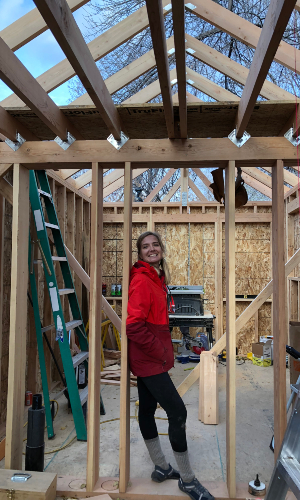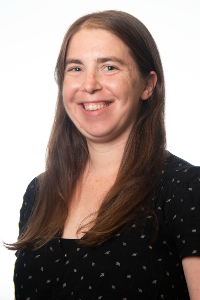Civic Scholars Program

Bobette Wilhelm Civic Scholars Program

The Bobette Wilhelm Civic Scholars Program empowers students to actively contribute to their community through substantive direct-service with a partner organization of their choice. The program is named after Bobette (Bobbi) Wilhelm ‘02, an Idaho State University alumna, who believed in the transformative power of education and the importance of improving the world in which we live throughout every stage of life.
Her personal experiences with housing and food insecurity taught her to see beyond stereotypes and recognize the inherent value of all people. In Bobbi’s own words, “we often make judgments about people who are in need, and most of the time those judgments are wrong. I want to challenge us all to look beyond a label and see a person.” In her passing, Bobbi left a significant donation to the UHP that will be transformational for students for years to come. In light of her commitment to civic engagement, her community, and education, the University Honors Program will honor her legacy through this academic certificate program and the Bobette Wilhelm Memorial Scholarship.
Civic Scholars Learning Outcomes
- Reflect on the application of service-learning in personal and professional settings
- Identify key factors in choosing a service partner
- Establish relationships through long-term service partnerships
- Analyze a community partner through gathering observational data
- Develop a proposal including action steps for a partner organization
- Present proposal to service partner and UHP representative(s)
Civic Scholars Program Requirements |
|
|---|---|
|
Requirements for Certificate in Civic Engagement |
HONS 3301: Introduction to Civic Engagement (1 Credit) HONS 3302: Civic Engagement & Research (2 Credits) HONS 3391: Honors Seminar (1 Credit) HONS 4482: Applied Civic Engagement (4 Credits, Taken Four Semesters) HONS 4494: Honors Service Capstone (1 Credit) |
|
Service Hours Requirements |
Students are required to complete 200 service hours with a partner organization of their choice. The connection to one partner organization demonstrates a level of commitment and makes carrying out their capstone project easier. The organization will be vetted by the Civic Scholars Program Coordinator prior to a student completing their hours. 200 Hours (Additional opportunity to network, understand the organization, and varied experiences) |
|
Honors Service Capstone Presentation |
Students will be required to write a final reflection and give a final presentation as the culminating activity of the Civic Scholars Program in order to earn the certification. The goal is for students to conduct a needs analysis, extrapolate themes from those needs, research the literature to see how other organizations have gone about addressing those needs, and then provide a proposal and plan of action for their partner organization. The slideshow and paper will also include a reflection about their experience, what they learned, and what their major takeaways were from the experience. This final presentation will be evaluated through pass/fail (with revisions as an option) by a service partner representative, the Civic Scholars Program Coordinator, and a member of the Honors Advisory Committee. |
Local Service Opportunities |
||||
|---|---|---|---|---|
|
Outdoors & Environment |
Healthcare |
Food Banks & Shelters |
Arts & Education |
Miscellaneous |
|
Heritage Healthcare of Idaho Hospice Care Alliance Healthcare of Idaho Hospice Care |
ISU Intensive English Institute Hispanic Youth Leadership Summit / High School Equivalency Program |
|||
HONS 3301: Introduction to Civic Engagement (1 Credit) | Every Fall
This course examines the foundational ethics of effective civic engagement and principles of public service. Students explore potential service partners and develop individual community impact projects.
HONS 3302: Civic Engagement & Research (2 Credits) | Every Spring
Experiential course that exposes students to specific local service-focused issues. Topics may include food insecurity, homelessness, and health access. Repeatable with different topics.
HONS 3391: Honors Seminar (1 Credit) | Every Fall & Spring
Exposes students to a range of critical and theoretical approaches within various disciplines in multiple seminars. Students formulate research problems and incorporate the results of their research into a seminar paper and/or oral presentation. May be repeated for up to 4 credits with different content.
HONS 4482: Applied Civic Engagement (1 Credit, Completed 4 Times) | Every Fall & Spring
An opportunity for the student to apply principles of civic engagement at an approved organization or program to work toward their Civic Engagement Capstone. For each credit, a student must complete 50 service hours.
HONS 4494: Civic Scholars Capstone (1 Credit) | Every Fall & Spring
Supervised by the Capstone Committee, students craft and present an in-depth capstone project that integrates personal reflection, present an analysis of their service partner, and develop a relevant research question.
Q1. If I pursue the Civic Scholars Program, am I still able to earn my Honors Distinction or Degree?
A1. Absolutely! All honors students must complete an Honors Distinction or Honors Degree. The Civic Scholars Program serves as a way to augment student’s honors curriculum through a service-focused program.
Q2. When can I complete service hours? Do hours count only during the Fall or Spring semesters?
A2. Service hours can be completed during the fall and spring semesters, as well as during summer and winter breaks. Hours completed in the fall or spring semesters must be submitted during finals week of that semester. Hours completed during winter or summer breaks must be submitted the week before classes start of the upcoming academic semester.
Q3. When can hours with a partner organization start to count?
A3. All service hours must be completed while the student is enrolled at Idaho State University. Students can continue volunteering with an organization they have worked with previously, but hours completed before the first semester at ISU cannot be counted. Please email the Civic Scholars Program Coordinator for any questions or concerns!
Q4. What happens if I am having a bad service experience and would like to switch my site? Do I need to start my hours over?
A4. If at least 100 hours of the required service are left, a student may switch to a different service partner if there is an issue with the organization. Students will be able to count the previous hours of service. Students will use the field notes and data gathered from the culminating experience for their presentation and reflection.
Q5. Can I be paid for my service?
A5. No, for this program we are specifically looking for volunteer service provided to a community partner organization. The only exception is for students receiving a stipend through an AmeriCorps-affiliated program, like Benny’s HealthCorps.
Q6. Can service be provided to a for-profit organization?
A6. Absolutely, as long as the organization has a demonstrated need for volunteer service, a history of working with volunteers, and has been reviewed by their advising coordinator. (EXAMPLE: Volunteer service at an assisted living home where a student develops patient care skills)
Q7. What type of organizations are not permitted as a service partner?
A7. Any organization that does not: 1) have a demonstrated need for volunteers, 2) have a history of working with volunteers, or 3) pass the review of the Civic Scholars Program Coordinator.
Q8. Can Civic Scholars serve remotely?
A8. Absolutely, as long as the Civic Scholars Program Coordinator can make contact with the organization’s representative for onboarding and communication purposes.
Q9. What happens if I falsify or misrepresent my service hours?
A9. The Civic Scholars Coordinator will conduct an investigation to understand the severity of the issue before rendering a decision along with the University Honors Program Director and Leadership Team.
Q10. What benefits do students receive as a Wilhelm Civic Scholar?
A10. Beyond having documented service hours, students will receive the Certificate of Civic Engagement and a special stole at the Honors Commencement ceremony to recognize their achievement.
Do you have questions that weren't answered in this list?
Send your question to Dr. Kathryn Holt at kathrynholt@isu.edu

